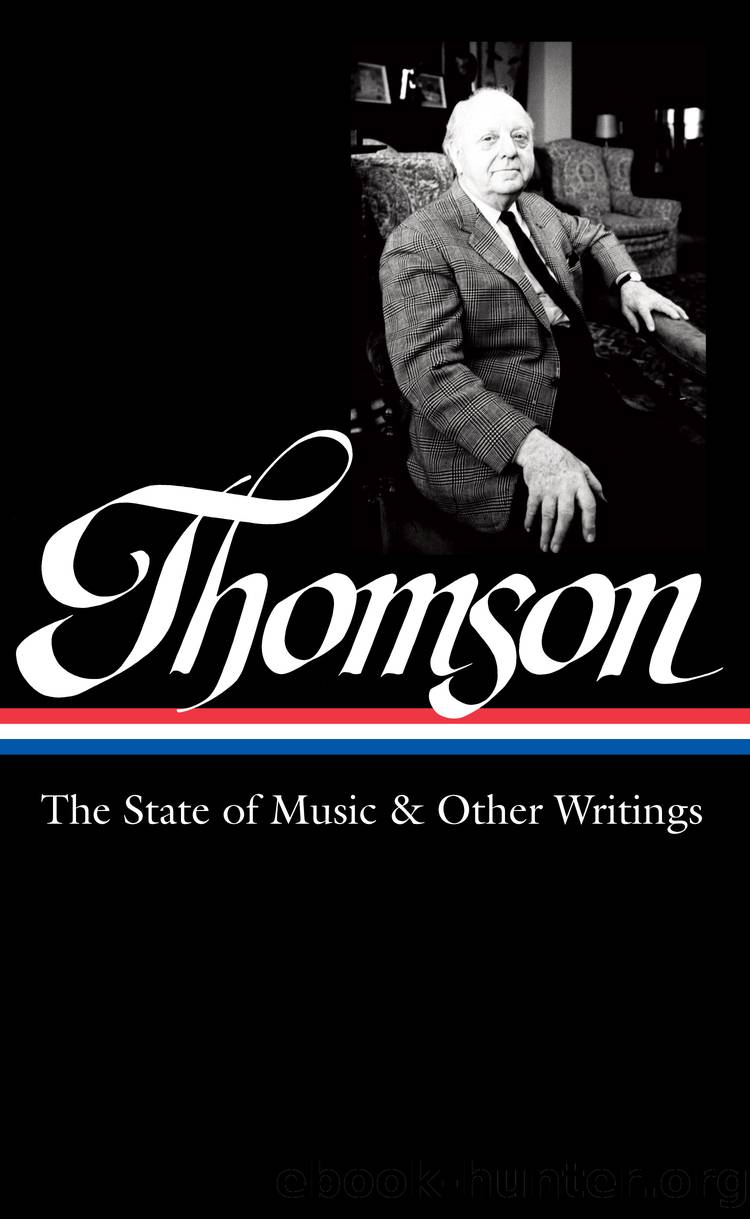Virgil Thomson by Virgil Thomson

Author:Virgil Thomson
Language: eng
Format: epub
Publisher: Library of America
Published: 2016-07-20T16:00:00+00:00
From
AMERICAN MUSIC SINCE 1910
Contents
1. America’s Musical Maturity
2. American Musical Traits
3. The Ives Case
4. Ruggles
5. Varèse
6. Aaron Copland
7. Looking Backward
8. Cage and the Collage of Noises
9. Let Us Now Praise Famous Men
A Suggested Reading List
1
America’s Musical Maturity
IN COLONIAL TIMES and during the first century of the republic, music in America grew abundantly and for the most part unguided. During the latter part of the nineteenth century a sort of adolescence had taken place, marked by attention to its educational needs and a preoccupation with its reproductive forces. In 1867 and ’68 the New England Conservatory of Music, in Boston, and the Chicago Musical College were founded, their aim being to train performers in the best European tradition, at that time esteemed to be the German. And in 1872 a department of music was founded at Harvard University to train composers, its model being the English universities, where the writing of music was taught as a liberal art separable pedagogically and socially from its performers.
As early as 1842 the Philharmonic Society of New York was founded for performing symphonic repertory, a precedent to be followed later in the century by St. Louis (1880) Boston (1881) Chicago (1891) Cincinnati (1895) Philadelphia (1900) Minneapolis (1903) San Francisco (1911) and other cities. Opera companies also came into existence, singing German, French, and Italian repertory in those languages (though the Metropolitan Opera Company for its first seven years, from 1882 to ’89, gave everything, including Bizet’s Carmen, in German). And the organized touring of reputable artists, along with tented chatauqua seasons in country towns (named after the summer camps for culture held in Chatauqua, New York) and indoor “lyceum” courses for the winter, offered high-standard concerts which served equally to cultivate the layman’s taste and to stand as models for those professionally aspiring. The gramophone industry too, by 1900, was beginning to distribute passable performances.
By that time also, composers were appearing whose technique, formed under German masters, was scarcely less competent than that of their similarly trained British colleagues. George W. Chadwick, Horatio Parker, and Edward MacDowell, all of whose lives crossed the century line, were the grandfathers of us all. As educated pioneers, they took title to professional status and passed it to their heirs. That title included right of access to the performing organizations. So that in the decades succeeding the first one of this century, performance of American works by the orchestras of New York, Boston, Chicago, and other cities came to be as acceptable to the public as it was instructive to the composer.
Our early great men, all the same—Chadwick and Parker and MacDowell—are merely ancestors. For all the charm and competence of their music, it is a pale copy of its continental models. Its thin perfume is of another time and place than twentieth-century America; and so, indeed, though more robust by far, is that of its contemporaries in operetta, Victor Herbert and Reginald de Koven. And for all that Chadwick and MacDowell had aspired, like Grieg and Smetana, to depict
Download
This site does not store any files on its server. We only index and link to content provided by other sites. Please contact the content providers to delete copyright contents if any and email us, we'll remove relevant links or contents immediately.
| Classical | Country & Folk |
| Heavy Metal | Jazz |
| Pop | Punk |
| Rap & Hip-Hop | Rhythm & Blues |
| Rock |
Cecilia; Or, Memoirs of an Heiress — Volume 3 by Fanny Burney(30929)
Cecilia; Or, Memoirs of an Heiress — Volume 2 by Fanny Burney(30886)
Fanny Burney by Claire Harman(25779)
We're Going to Need More Wine by Gabrielle Union(18067)
Plagued by Fire by Paul Hendrickson(16632)
Cat's cradle by Kurt Vonnegut(13857)
Bombshells: Glamour Girls of a Lifetime by Sullivan Steve(13102)
All the Missing Girls by Megan Miranda(12741)
Leonardo da Vinci by Walter Isaacson(11897)
4 3 2 1: A Novel by Paul Auster(11035)
Adultolescence by Gabbie Hanna(8138)
The remains of the day by Kazuo Ishiguro(7544)
Note to Self by Connor Franta(7023)
Diary of a Player by Brad Paisley(6865)
Giovanni's Room by James Baldwin(5873)
What Does This Button Do? by Bruce Dickinson(5522)
Recovery by Russell Brand(4560)
Born a Crime by Trevor Noah(4508)
The Kite Runner by Khaled Hosseini(4417)
